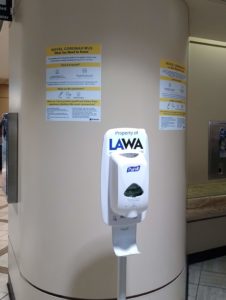It’s an emergency and, therefore, it’s once again time for price-gouging idiocy and the further destruction of liberty in America.
The New York Times reports that two brothers, Matt Colvin and Noah Colvin, who stockpiled 17,700 bottles of hand sanitizer have entered into a settlement with state officials in Tennessee that enable them to avoid criminal prosecution. Since the brothers have donated their supplies to people, state officials decided that that constituted sufficient punishment.
Why, isn’t that nice of them?
The brothers had sold 300 bottles of hand sanitizer on Amazon for at a much higher price than what they had paid. In other words, they were making a big profit on the items.
A profit! OMG! How terrible is that! Where are Mao, Stalin, Fidel Castro, and other socialists when we need them?
The Tennessee price-gouging law prohibits people from setting “unreasonable” prices for essential items in an emergency. Of course, “unreasonable” is whatever state officials say it is.
It’s probably worth mentioning that the Colvin brothers have been made to promise that they will be good little boys and not do it again. Expressing sorrow and repentance is always an important aspect of any price-gouging settlement.
A free society — a genuinely free society (as compared to a society that falsely purports to be a free society) — is based on the principle of private ownership of property. In a society based on private property, people are free to sell whatever they own for whatever they want, regardless of emergency or crisis.
After all, it’s their property. They own it. Not the state. Not society. Not others. The owner owns it. Given that he owns it, he has to right to do whatever he wants with it — hoard it, sell it, or even destroy it. No one has the right to force anyone to give up what he rightfully owns.
By the same token, people have the right not to buy whatever a person is selling. If someone doesn’t like the price at which an item is selling, he is free to walk away. The owner has no right to force anyone to buy the item he is selling and at the price at which he is selling it.
It’s no different in an emergency or crisis. What a person owns is his.
Speculators — or “price gougers as state officials call them — are people who risk their money to buy and stockpile items that they think are going to be in scarce supply. Speculators seem to have a special talent in recognizing profit opportunities in markets, a talent that most people lack.
I highly recommend reading one of the best essays ever written on speculators — “The Speculator as Hero” by libertarian Victor Niederhoffer, which appeared in the February 10, 1989, issue of the Wall Street Journal. You can read it here on FFF’s website.
Oftentimes, speculators will buy large quantities of items with the expectation that market conditions are going to be such that they will be able to sell their stockpiled items at an enormous profit.
They have every right to do that. Everyone has the right to buy whatever he wants to buy and then sell it for whatever he wants. But keep in mind an important caveat: You might lose your shirt doing this. If a crisis or emergency doesn’t materialize, you might be stuck with thousands of bottles of hand sanitizer or N95 masks that you have to sell at a loss.
That’s the nature of market speculation. it’s not a risk-free endeavor. It’s not for everyone. In fact, it’s not for most people. Speculators have been known to lose their entire fortune in just a few speculative trades.
A speculator performs an invaluable service for society. When the emergency or crisis hits, he immediately raises the price of his item — maybe, say, by 1800 percent. That tremendous increase in price immediately sends a signal to consumers that says: “Time to conserve this item. It’s scarce. Don’t waste it.” At the same time, it sends a message to producers: “Time to produce this item if you want to make money.”
That message is what brings things back into balance. People conserve while the item is in scarce supply and producers begin producing with the aim of flooding the market with additional items.
State officials and their price-gouging laws destroy this critically important information-sending aspect of a market economy. By keeping prices of essential items artificially low, they send the following message to consumers: “No need to conserve. Just keep doing what you were doing before. Supplies are plentiful.” At the same time, they send the following message to sellers: “No need to produce additional items. There is no profit in it.”
It’s a shame that state officials have still not learned economic principles that were set forth as far back as 1776 in Adam Smith’s book The Wealth of Nations. Instead of going after price-gougers, they should be suing their college economics professors for educational malpractice.


